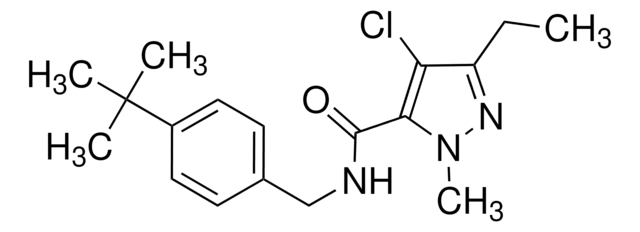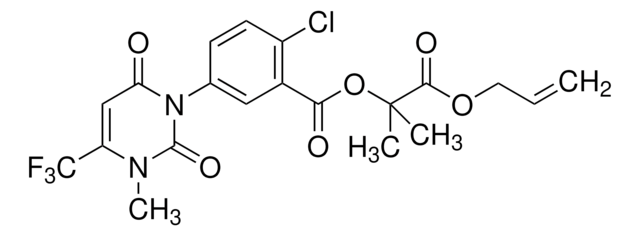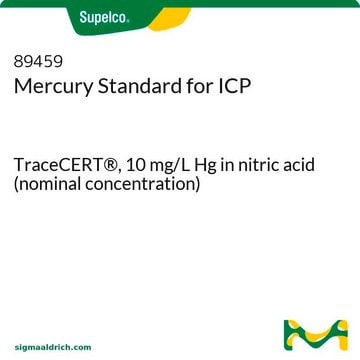CRM52554
Spiroxamine
certified reference material, TraceCERT®, Manufactured by: Sigma-Aldrich Production GmbH, Switzerland
Synonym(s):
N-Ethyl-N-propyl-8-tert-butyl-1,4-dioxaspiro[4.5]dec-2-ylmethylamine
About This Item
Recommended Products
grade
certified reference material
TraceCERT®
Quality Level
product line
TraceCERT®
shelf life
limited shelf life, expiry date on the label
manufacturer/tradename
Manufactured by: Sigma-Aldrich Production GmbH, Switzerland
format
neat
storage temp.
2-8°C
SMILES string
CCCN(CC)CC1COC2(CCC(CC2)C(C)(C)C)O1
InChI
1S/C18H35NO2/c1-6-12-19(7-2)13-16-14-20-18(21-16)10-8-15(9-11-18)17(3,4)5/h15-16H,6-14H2,1-5H3
InChI key
PUYXTUJWRLOUCW-UHFFFAOYSA-N
Looking for similar products? Visit Product Comparison Guide
Related Categories
General description
Certified content by quantitative NMR incl. uncertainty and expiry date are given on the certificate.
Download your certificate at: http://www.sigma-aldrich.comSpiroxamine is a systemic fungicide that belongs to the class of synthetic amines or morpholines. It targets the ∆14-reductase enzyme and inhibits sterol biosynthesis. It is used against powdery mildew, rust, and spot fungi on cereals and grapes for its protective, curative, and eradicative activities.
As per Regulation (EC) No. 1107/2009, repealing directive 91/414/EEC, spiroxamine is approved for use in the European Union (EU). A maximum residue limit (MRL) of 0.01 mg/kg and 0.05 mg/kg is applicable for the presence of spiroxamine in fresh/frozen fruits and tree nuts respectively, in accordance with Regulation (EC) No. 2016/452. Spiroxamine is to be monitored in the Multiannual Control Programme for Pesticides Residues (MACP), run within the EU and EFTA in/on products of plant origin.
Application
The spiroxamine CRM may also find the following uses:
- Development of an enantioselective method to determine three fungicide residues in grapevine, sugar beet, and wheat samples by gas chromatography-tandem mass spectrometry (GC-MS/MS)
- Quantification of 19 neonicotinoids and fungicides from pollen and individual bumblebee samples using modified QuEChERS extraction with ultra-high performance liquid chromatography-tandem mass spectrometry (UHPLC-MS/MS)
- Evaluation of a gas chromatographic method with electron capture and nitrogen phosphorus detection (GC/ECD/NPD) for the analysis of 46 pesticides in fresh peppermint samples
- Multi-residue determination of 25 pesticide residues in red wine by gas chromatography-mass spectrometry(GC-MS)
- QuEChERS extraction and liquid chromatography-tandem mass spectrometry based determination of 42 pesticides in six marijuana samples
- Investigation of three different sample preparation methods to select the most suitable one for the analysis of 98 pesticides in globe artichoke leaves and fruit samples by LC-MS and GC-MS
Legal Information
Signal Word
Warning
Hazard Statements
Precautionary Statements
Hazard Classifications
Acute Tox. 4 Dermal - Acute Tox. 4 Inhalation - Acute Tox. 4 Oral - Aquatic Acute 1 - Aquatic Chronic 1 - Repr. 2 - Skin Irrit. 2 - Skin Sens. 1 - STOT RE 2
Target Organs
Eyes
Storage Class Code
10 - Combustible liquids
WGK
WGK 3
Flash Point(F)
296.6 °F
Flash Point(C)
147 °C
Choose from one of the most recent versions:
Certificates of Analysis (COA)
Don't see the Right Version?
If you require a particular version, you can look up a specific certificate by the Lot or Batch number.
Already Own This Product?
Find documentation for the products that you have recently purchased in the Document Library.
Our team of scientists has experience in all areas of research including Life Science, Material Science, Chemical Synthesis, Chromatography, Analytical and many others.
Contact Technical Service











